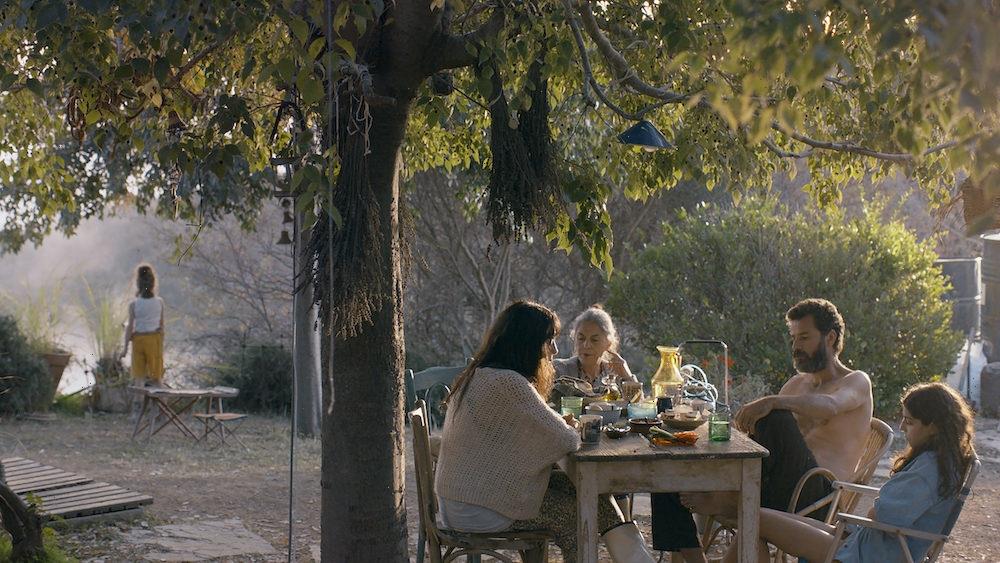“Where will we run away to this time?” asks Soraya Bakri (Nadine Labaki) of her husband Walid (Saleh Bakri), partly joking but mostly not, when what looks like all the trash in Beirut appears on their rural hideaway’s doorstep. Mounia Akl’s “Costa Brava, Lebanon,” is mostly a bittersweet dramedy built from an intimate, sprightly understanding of internal family dynamics, but it is fringed with the implicit melancholy of Soraya’s question. When she and Walid left noisy, polluted Beirut eight years prior to raise chickens, vegetables and two daughters on a little plot of land in the countryside, were they running-toward or running-away-from? And if living off-grid is your dream — or the dream of the one you love most — what do you do when the grid comes to you?
Dealing with an issue that locates it sometime during the 2015 Beirut Garbage Crisis, when the streets of the city were overflowing with uncollected trash, Akl’s feature debut is a heartfelt charmer that feels sharper and truer in its lovably eccentric character-building than in its grander, more political statements. Partly that may be down to the film’s timing: it was shot, against all odds, just a couple of months after the August 2020 Beirut Port blast that claimed more than 200 lives and sent the nation into a tailspin of trauma the like of which it hadn’t known since the end of its 15-year civil war in 1990. Premiering in Venice barely a year after the incident, its observations about self-determination vs. social responsibility and how much love of one’s country mandates critique of its governance, can’t help but feel a little lacking in urgency by comparison.
Mostly, though, the way the film skews toward the personal and away from the overtly political can be attributed to the fine performances from its likable ensemble — well, that, and to Akl’s perceptive writing of this family as a collection of singular individuals who just so happen to be related to one one another. Soraya, at one time a well-known singer, met Walid, a committed activist, during a protest in Beirut. But after having their first child, Tala (Nadia Charbel), they moved away from the city to a farmhouse owned by Walid’s sister Alia (Yumna Marwan), an expat urban sophisticate living a very different life in Colombia.
Here, living with Walid’s aging but feisty, outspoken mother Zeina (Liliane Chacar Khoury) they had their second child, Rim (played jointly by twin sisters Ceana and Geana Restom), who has only known this hardworking but pastoral lifestyle and has grown wild around it like a vine, even developing her own numerological mysticism which has her in the habit of counting upwards constantly. “Rim eats like a pig,” says her grandmother as the little girl scoffs her dinner one night. “She is free,” Soraya replies placidly.
All this personal freedom is threatened when the Beirut authorities, overwhelmed by the municipal trash crisis, announce with some pomp that right next door to the Bakris there is to be a landfill. Under the supervision of slick official Tarek (François Nour), on whom Tala develops a teenager’s crush, a crater is blasted into the hillside, which despite assurances that it is going to be environmentally “green,” quickly fills up with acid-blue garbage bags, becoming not just an eyesore but a potential health hazard that at one point turns the water in the Bakris’ little swimming pool blood-red.
Walid rails against the development and looks into legal avenues of recourse, while Soraya, despite loving her husband and understanding his desire to get away from society, more pragmatically begins to plan for a move back to Beirut. It is an interesting note in Akl’s screenplay and in Labaki’s warm, conflicted performance that Soraya has an abiding, almost naive nostalgia for her more socially-engaged days — perhaps as much because she associates them with her own youth as because of an innate belief in the power of popular protest.
“Costa Brava, Lebanon” is lightly embellished with magic realist flourishes, just as Nathan Larson’s pleasant score lets lightly humorous horns meld with more winsome, minor-key melodies. The bright, sun-splashed daytime, during which Joe Saade’s camera roves in among the chickens and the kids’ kicking legs, segues softly into more dreamlike, low-lit nighttime scenes that occasionally turn surreal.
Walid imagines the ugly blue trash bags catching fire and rising into the night sky like Chinese lanterns; Soraya gazes absently out of a window through which the landscape starts to move, as though she’s on a train pulling out from a station, bound for who knows where. These moments, a generally honeyed tone and a slightly anticlimactic resolution, do further pull back on the punchier politics of the film’s premise, however, and stop it some way short of its full potential: The gentle wisdom it contains is less to do with activist and environmentalist issues and more attuned to country, family and lifestyle choices as abstract concepts, as all the things we mean by the word “home,” which is where Akl’s heart is.
Source: Read Full Article
